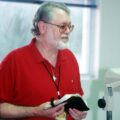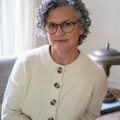 Author of Eight Original Books
Author of Eight Original Books
by Trisha Bleau Smith
T4JYM: Having read a few of your books targeted at youth I have a pretty good idea of your writing style and know how interesting your books generally are. Where do you tend to draw your ideas for writing the various books from? What is your inspiration for writing?
SJ: The first series of books I wrote for Christian Focus – the ‘Jane’ series – came about because I read through an old diary I kept when I was 11-16. When I looked at the stuff I’d written when I was about 12-14 I remembered what it was like to go to a school I didn’t like – and feeling that life was pretty tough. I used to like writing sci-fi stories – probably as some sort of ‘escape’ from real life! – so I thought that would be the basis for an interesting novel… the other stories about Jane grew from there.
With the ‘Life’ series, the stories about Sammy, I just thought she would be a different and interesting character to write about. I’d worked with teens as a youth leader and in school evangelism for a short time and I thought that maybe some of the issues Sammy struggles with would ‘speak’ to that age group. You know, issues about love, sex, and relationships, bullying etc, and trying to be a Christian when it’s really hard – and your friends aren’t Christians. I think to be a Christian and a teenager today is very difficult and I really admire any young person who follows Jesus.
As for my ‘adult’ novel, Watchers, I wanted to say something about how I view our society today… you can often put a strong world view across within a fictional setting! It’s futuristic action adventure and the ideas came from all sorts of places, including this derelict area in my town where they were taking down old buildings. It looked lost, barren, scary… like the Old City in the book. When I was writing the book I even got inspired by the layout of the local garden centre which you can spot in the novel as part of the decadent Relaxation Centre.
Daily life, memories, friends, deep feelings and impressions… even driving down a dark road, looking at lights in a distant city… anything like this can inspire a scene in a novel or give a writer a good idea.
Most of all, as a Christian writer, I am saying something about living for God… things I have found to be true in my own life. I know what it’s like to live without God, and believe me, it’s better to know Jesus! I want to share the reality of Jesus and what he has done for me, in my writing – a form of evangelism, I guess. That’s my real motivation and inspiration.
T4JYM: What publishers have you worked with? Is Christian Focus Publications the only publishing house you have submitted your work to?
SJ: No, I have just had my first ‘adult’ novel published by Authentic Lifestyle (mentioned above). I thought adults would enjoy Watchers which is very different to my other books. It’s set in a future society where people can become ‘illegal’ and if that happens, life becomes a nightmare. However, I am getting feedback from teens who really like the novel too. (I think the girls fancy the hero!)
T4JYM: Who have been your biggest influences in life? Who have been your biggest influences in your life as a writer?
SJ: In life: my mum who has always encouraged me! Also my granny, who isn’t with us any more… I wasn’t brought up in a Christian home so church and Sunday School wasn’t part of my life but my granny always told me the stories of Jesus. I got fed up with this later, but when my life fell apart, I remembered what Gran had said (and I read a really good book that showed me that you could have a ‘real’ relationship with God… see below, Bilquis Sheikh’s book) and decided to give Jesus a real try! He was really there… I’ve been a Christian ever since.
As a writer, I have been influenced by two authors in particular: I Dared to Call Him Father by Bilquis Sheikh – the story of a Muslim woman who came to know Jesus. This knocked me out at the time because I didn’t know Jesus like that and I thought, if you can know God this way, then I want it!!! And also Sit, Walk, Stand by Watchman Nee. This book tells you about chilling out and not stressing: I believed God wanted me to work for him but I was ill at the time and couldn’t do anything (this is before I got any books published). God spoke to me at that time and said ‘I don’t want you to work for me, I want to do my work through you!’ So I gave up striving. God loves us, he wants us to be his friends! So I would say these two writers have had the most positive impact on me spiritually.
When you realize how powerful books can be, how God can talk to you through them, then that influences you as a writer… you start to think, hey, maybe God will use my writing in someone’s life. You know, when I was a kid, I read a lot of ‘pony’ stories because I loved horses but I lived in a city so I didn’t get to ride ponies much! Yet when I see frosty fields now, I think of ‘my childhood’ galloping about frozen fields on ponies… only I didn’t actually do that, I only read about it! The power of fiction! If one person remembers just one thing about Jesus from my books, when maybe they are in trouble or whatever, and decides to turn to God, then that’s great.
T4JYM: How have your books been received by the general public? Has there been positive feedback? Any negative feedback?
SJ: I have had some great positive feedback. I think the best is when someone says they gave a copy of one of your books to a kid in their church (in this case A Different Life) and they read it and gave their heart to Jesus. I know of one young person who read Rollercoaster Time and God spoke to them through it. Stuff like that is just brilliant.
Someone likened Watchers to the films Terminator and Blade Runner and it’s been called a ‘powerful Christian allegory’. I also notice Watchers gets taken out of our public library a lot… it’s in the Young Adult Section. I think it’s quite an unusual, radical sort of book so I have had people tell me they loved it and some who have said it was difficult to get into but once they did, they couldn’t put the book down. Someone phoned me and criticized it (a friend), but then asked me if I was writing a sequel because they wanted to see what happened next! Most readers seem to want to read more, so that’s good!
T4JYM: Can you give us an idea of some of the titles you have written so that our readers can get a general idea of the types of books you write?
SJ: Aliens and Strangers, Rollercoaster Time (which won the CBC Gold Award 1998 for Published Children’s Books) and Something to Shout About are stories for about 13/14 year old Jane who becomes a Christian – a very ordinary girl with ordinary problems, learning about how to live for God. She writes wild science fiction about her ‘heroine’ Sandra Richmond, who is fearless, brave – everything Jane isn’t. A Different Life, This New Life, A Life Worth Living and It’s my Life are about Sammy, 13/14, who lives with her mum. Sammy isn’t a Christian at the start of the series… she’s struggling to get her mum to see her as a young adult instead of just a kid! She gets to know Jesus, and finds out he has good plans for her life. These books are humorous, light-hearted with a serious message… and hopefully talk honestly about everyday problems. Watchers as I am sure you realize by now, is very different. That’s for anyone who wants to read about a dark society where you can’t be old or sick or in debt, and where this elite security force of ruthless hit men can take you out at any moment… and what happens when the top Watcher, Mike Merrick, gets some information about a group of Illegals who should be dead. He goes after them and gets a lot more than he bargained for!
T4JYM: Do you do any other kinds of writing – magazines, newspapers, etc.?
SJ: I used to be a press officer for a football club (yes really) and have had regular columns in a newspaper and a magazine, but these days, although I sometimes get asked to write articles, I don’t do so much of that sort of writing. I work as an editor on Christian books etc. so mostly I am working on other people’s material which is very enjoyable. I write readers reports and that kind of thing – I love it.
T4JYM: What are your next plans for writing? What are some ideas you have for new works?
SJ: I am thinking about writing Watchers 2 as so many people seem to want to read what happens next! I’m hoping to send off a few sample chapters and an idea for the rest of the book to the publisher sometime before the spring – God willing.
T4JYM: What is generally your target audience? How do you decide on what audience to focus your writing on?
SJ: With the teen books for Christian Focus, I felt as if there was something I really wanted to share with young people – stuff that perhaps I wish I’d known about when I was a teen. I suppose the whole key to writing is to write what you feel strongly about, and knowing Jesus is alive and loves you, and living for God but also being a normal human being in the real world, and having to deal with that, is, to me, pretty important!
As for Watchers, that was different. I never believed it would ever be published… it had been in the drawer for about 9 years! Some of the material, I thought, was a bit dark for a Christian book although the whole story is very positive. I suppose this was the sort of book I wanted to read, myself and I didn’t think anyone else would want to read it; so there was no ‘target’ audience for this one, and I didn’t focus on any particular audience – unusual for me! Amazingly, the publishers did like it – so much they asked me to double the amount of words which was a real challenge but very fulfilling. I really enjoyed writing it – I think, if you don’t enjoy what you are writing, then your readers won’t enjoy reading it!
T4JYM: When do you do your best writing and where?
SJ: I think I do my best writing when a publisher is actually interested in what I am doing (gives me the extra kick I need, the incentive!). When I’m working on a project, my best ideas come when I am not actually thinking about the story – it tends to take on a life of its own. I seem to get my best inspiration in the middle of the night (dialogue at 3 a.m.) and driving along the bypass to the DIY shop, walking the dog… it just zaps into my mind.
I think a lot of writers are a lot more disciplined than me: they set targets of a few hours per evening, or a certain amount of words per day. I’m not like that: I either don’t write anything or I’m totally obsessed until the thing is finished!
T4JYM: What training do you have in writing? Did you take any writing courses in college to obtain the skills you have currently?
SJ: I loved English at school and did ‘A’ level – but that was in literature. I loved writing. I was sending novels off to publishers from the age of about 13 or 14, but couldn’t get any of my novels published so in the end I took a correspondence course in creative writing. People sometimes say these kinds of courses aren’t too great but I learned a lot. You can never stop learning. In fact, if you can’t take criticism, don’t be a writer!
T4JYM: What advice would you give to someone who wants to pursue a career in writing?
SJ: For a novelist? Get a day job! Do your writing in the evening or weekends. Novelists don’t all get whacking great advances and royalties that mean you can buy a Porsche, a mansion in California, etc. (I drive a Mini!) As for careers in the world of writing, not meaning writing novels: well, there’s journalism… I started out as a copywriter for an advertising agency. But I didn’t much enjoy it, and I can’t really comment on journalism because that isn’t really my bag.
T4JYM: What advice would you give to someone interested in publishing their works?
SJ: Being published isn’t the be all and end all in writing. Some people don’t have any desire to be published – they are happy writing for their own enjoyment, and that’s fine. But writing is about communication – communicating your thoughts and ideas. To me, it was important to be published because otherwise it’s a bit like baking a cake that no one wants to eat, or having a one-way phone conversation!
But it is hard to get a novel accepted for publication. There are so many people out there writing good stuff – and some of them don’t get published because they are writing for the wrong market, or haven’t honed their skills enough. So here are a few tips – although of course none of this guarantees publication.
- Ask God what you should be doing with your life. It might be that he has terrific plans for you to be a musician, actor, sports star, whatever, and not to be a novelist at all! I only got published after I was prepared to give up writing for ever – give up my ambition to God. Do it! He has the best plans for your life.
- If you feel you still want to write, learn everything you can about your craft. I can put a fence up in my garden when the wind blows it over, but it doesn’t make me a carpenter! Get on a course, join a writer’s circle, make your writing as good as it can be. Take criticism! Don’t be afraid of rejection. You want to have something about your writing that makes an editor want to read more.
- Write stuff that people want to publish! So many writers forget about markets – publishers have to sell books, so you have to write what people want. Some publishers send out guidelines for the sort of thing they want to publish so ask them what they want, and write it. If you want to write something in particular, such as romance, then don’t send your novel to a publishing house that doesn’t do romance! Look at books at your local library that are the sort of thing you want to write – who publishes them? Are they looking for new writers? Write with enthusiasm. It will come across to your reader.
- Remember, there are two important things in writing a book – plot and dialogue. Your plot is the story, and dialogue can reveal character traits very effectively. Listen to dialogue in your favorite soaps etc on TV. Be objective as you watch TV drama – how is the writer making you believe in the character? You can learn a lot by listening to how the writers have made the characters relate to each other – note that the characters’ speech portrays their personality. An interesting plot is one where we can engage with the character and see how they cope with ‘crises’ events in their lives.





Be the first to comment